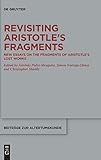Revisiting Aristotle’s Fragments : New Essays on the Fragments of Aristotle’s Lost Works / ed. by António Pedro Mesquita, Simon Noriega-Olmos, Christopher John Ignatius Shields.
Material type: TextSeries: Beiträge zur Altertumskunde ; 388Publisher: Berlin ; Boston : De Gruyter, [2020]Copyright date: ©2020Description: 1 online resource (VI, 304 p.)Content type:
TextSeries: Beiträge zur Altertumskunde ; 388Publisher: Berlin ; Boston : De Gruyter, [2020]Copyright date: ©2020Description: 1 online resource (VI, 304 p.)Content type: - 9783110679786
- 9783110679939
- 9783110679847
- online - DeGruyter
- Issued also in print.
| Item type | Current library | Call number | URL | Status | Notes | Barcode | |
|---|---|---|---|---|---|---|---|
 eBook
eBook
|
Biblioteca "Angelicum" Pont. Univ. S.Tommaso d'Aquino Nuvola online | online - DeGruyter (Browse shelf(Opens below)) | Online access | Not for loan (Accesso limitato) | Accesso per gli utenti autorizzati / Access for authorized users | (dgr)9783110679847 |
Frontmatter -- Table of Contents -- Introduction -- I. Philosophy and Philosophical Perspectives in Aristotle’s Fragments -- What is Philosophy in the Protrepticus? -- Aristotle’s Philosophêmata -- On the Role of the Platonic Interlocutor in Aristotle’s Dialogue On Philosophy -- Aristotle on Wine and Intoxication -- II. Philosophical Problems in Light of Aristotle’s Fragments -- The Lost On Philosophy and Aristotle’s Natural Philosophy -- Athenaeus’ Deipnosophistae 7 and Aristotle’s Lost Zoïka or On Fish -- In Dialogue about Harmony -- The Spurious Fragments of a Supposed Aristotelian Argument from Design -- Aristotle’s Lost Dialogue On Good Birth and Kingship as the Best Regime -- Did Homer Nod Off? Aristotle and Homeric Problem-Solving -- Bibliography -- Index of Passages -- Index of Names
restricted access online access with authorization star
http://purl.org/coar/access_right/c_16ec
The philosophical and philological study of Aristotle fragments and lost works has fallen somewhat into the background since the 1960’s. This is regrettable considering the different and innovative directions the study of Aristotle has taken in the last decades. This collection of new peer-reviewed essays applies the latest developments and trends of analysis, criticism, and methodology to the study of Aristotle’s fragments. The individual essays use the fragments as tools of interpretation, shed new light on different areas of Aristotle philosophy, and lay bridges between Aristotle’s lost and extant works. The first part shows how Aristotle frames parts of his own understanding of Philosophy in his published, 'popular' work. The second part deals with issues of philosophical interpretation in Aristotle’s extant works which can be illuminated by fragments of his lost works. The philosophical issues treated in this section range from Theology to Natural Science, Psychology, Politics, and Poetics. As a whole, the book articulates a new approach to Aristotle’s lost works, by providing a reassessment and new methodological explorations of the fragments.
Issued also in print.
Mode of access: Internet via World Wide Web.
In English.
Description based on online resource; title from PDF title page (publisher's Web site, viewed 28. Feb 2023)


